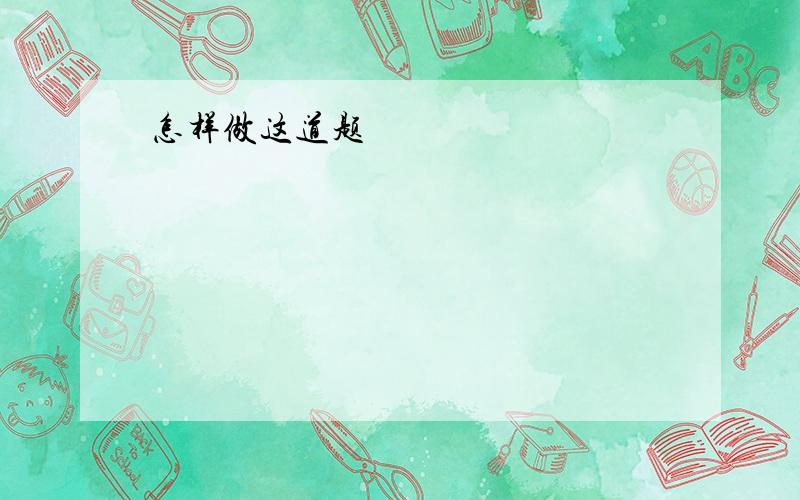怎样做这道题
来源:学生作业帮 编辑:神马作文网作业帮 分类:英语作业 时间:2024/11/20 02:52:39
1. You ______ be late for school again next time. A. mustn’t B. needn’t C. don’t have to D. don’t need to 2. —-Must we do our homework first? —-No, you______. You may have a rest first. A. mustn’t B. needn’t C. may not D. can’t 3. It’s a good way ______ down the different meanings and remember them together. A. of write B. to write C. writes D. to writing 4. When it’s sunny on Sunday, I often ______ a trip. A. have B. am having C. has D. having 5. It’s a good idea ______ an umbrella. A. bring B. bringing C. brings D. to bring 6. —______ weather! It’s raining. --–Bad luck! We have to stay at home all day. A. What fine B. How fine C. How bad D. What bad 7. You ______ give a clock to a Chinese ______ a present. A. can, for B. mustn’t, as C. can’t, in D. can, as 8. Don’t get off the bus________ it has stopped. A. until B. if C. to D. for 9. You open the present immediately, it is a__________ manner in China. A. good B. well C. bad D. badly 10. We must wrap hongbao___________ red paper because it is lucky. A. in B. on C. at D. of 11. If you meet John Smith, you can call him____________. A. Mr John B. Mr Smith C. Miss John D. Miss Smith 12. You must________ more careful. That car nearly hit you. A. are B. be C. is D. were 13. —Will you please stay here for the party? —Sorry,I________. I’ll have to go an important meeting. A. mustn’t B. needn’t C. can’t D. won’t Tea is popular____1___the world, but___2___than three hundred years ago most of the people in Europe didn’t know__3___about tea. Once an English doctor came back from China___4___Christmas. He gave his mother some tea as a present. She told her friends___5____the present and asked them to come to a “tea party”. When her friends came, the old woman took out some tea-leaves and asked them___6___. Of course, ___7___liked the tea-leaves. Just at that time the doctor came___8___. He looked___9___the table and asked “Mother, what did you do with the tea?” “I boiled it as you said.” “And what did you do with the water?” “I__10____it away, of course.” answered the old woman. “Now you may throw away the leaves, too.” said the doctor. 1. A. on B. in C. at D. for 2. A. much B. many C. more D. most 3. A. something B. nothing C. anything D. everything 4. A. at B. for C. on D. with 5. A. of B. about C. for D. with 6. A. to eat B. eating C. eat D. eats 7. A. somebody B. everybody C. anything D. nobody 8. A. into B. in C. on D. at 9. A. for B. after C. up D. at 10. A. poured B. put C. took D. drank In England, people don’t usually talk very much. When you travel on a bus or in a train, you can find that everyone sits looking out of . Often they read books and news papers. They don’t talk much. When you meet English people who are talking, they often talk about one thing — the weather. So when you meet someone in England, you can say, “Nice weather for the time of year!” “But it was a little cold yesterday,” someone may answer. “But it got a bit warmer later!” you can say. If you talk like this, the English will think, “How friendly you are!” 1. _____ people don’t talk much in a train. A. Chinese B. American C. English D. Japanese 2. English people often _____ on a bus. A. read B. talk C. sing D. sleep 3. English people often talk about the _____ when they meet. A. news B. sports C. weather D. travel 4. When you meet someone in England, you say, “ ____” A. What’s the time? B. Where are you going? C. Fine day, isn’t it? D. What did you have for dinner? 5. The English will think _____ when you talk about the weather with them. A. you are friendly B. you are unfriendly C. you enjoy the weather D. you like the weather 1. You____________ play on the road. It’s dangerous. 2. The young people who is under 18 years old____________ go to the web club. 3. You____________ stay here for two hours. 4. When you get a birthday present, you____________ say “thank you”. 5. You____________ go to school on time. 6. You____________ sing the song here. Everyone likes. 7. We____________ wash our hands before we eat something. 8. —____________ I play games on the computer? —No, you can’t. 9. In Britain, we____________ use one hand to take the present, but in China we____________ use two hands. 10. You____________ drive on the correct side of the road. 1. 接受礼物___________ 2. 打扫卫生___________ 3. 洗餐具____________ 4. 结婚__________ 5. 扔垃圾 _________ 6. 传统生活_______________ 7. 停止聊天_____________ 8. 快点,赶紧 _________ 1. We Chinese have meals with ___________(筷子). 2. Please hand in your homework __________(马上). 3. Doctors say __________ (抽烟)is bad for us. 4. Different people from different places have different _________(风俗习惯). 5. You mustn’t __________(大喊)in class. 6. Yesterday my friend lost her p_________, but there was much money in it. 7. Head is a part of person’s b_________. 8. —When did you r___________ your friend’s letter? —Yesterday. 9. We wash clothes with water and s__________. 10. Some people don’t think 13 is a l__________ number, they don’t like it.

解题思路: 见下
解题过程:
同学,每次提一个问题,新问题请重新提交。
单项选择:
ABBAD DDACA BBC
最终答案:略
解题过程:
同学,每次提一个问题,新问题请重新提交。
单项选择:
ABBAD DDACA BBC
最终答案:略